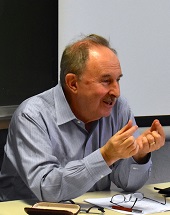Install the app
Install this application on your home screen for quick and easy access when you’re on the go.
Just tap then “Add to Home Screen”
Install this application on your home screen for quick and easy access when you’re on the go.
Just tap then “Add to Home Screen”
Install this application on your home screen for quick and easy access when you’re on the go.
Just tap then “Add to Home Screen”

For this Summer School, we invited leading academics to deliver insightful lectures on key methods in normative political theory.

Kristoffer Ahlstrom-Vij, Reader in Philosophy, Birkbeck College
Kristoffer Ahlstrom-Vij is Reader in Philosophy at Birkbeck, University of London, and Research Fellow at the National Institute of Economic and Social Research. He works in social epistemology, both theoretical and applied, and his most recent work focuses on the nature and measurement of political knowledge.
His publications include Epistemic Consequentialism (Oxford University Press, 2018, with Jeffrey Dunn), Epistemic Paternalism: A Defence (Palgrave Macmillan, 2013), and articles in Noûs, Philosophy and Phenomenological Research, Philosophical Studies, and other journals.

Sophie Grace Chappell, Professor of Philosophy, Open University
Sophie Grace Chappell is Professor of Philosophy at the Open University, UK, Leverhulme Major Research Fellow 2017-2020, Visiting Fellow in the Department of Philosophy, St Andrews 2017-2020, and Erskine Research Fellow, University of Canterbury NZ, Spring 2020.
She was educated at Magdalen College, Oxford, and Edinburgh University. She was Director of the Scots Philosophical Association, 2003-2006. Since 2000 she has been Reviews Editor of The Philosophical Quarterly and Treasurer of the Mind Association. In 2021 she will be a REF sub-panellist for Philosophy. She has held visiting appointments in the Universities of Edinburgh, Glasgow, British Columbia, Stirling, Reykjavik, and Oslo. She has published over a hundred articles on ethics, moral psychology, epistemology, ancient philosophy and philosophy of religion. Her books include Aristotle and Augustine on Freedom (Macmillan, 1995), Understanding Human Goods (Edinburgh University Press, 2003), The Inescapable Self: an Introduction to Philosophy (Orion, 2005), Reading Plato’s Theaetetus (Hackett, 2005), Ethics and Experience (Acumen, 2009), and Knowing What to Do: Imagination, Virtue, and Platonism in Ethics (Oxford University Press, 2014). She has also edited or co-edited five collections of essays in ethics, most recently The Problem of Moral Demandingness (Routledge 2011), Intuition, Theory, and Anti-Theory in Ethics (Oxford University Press, 2015) and Ethics Beyond The Limits: Essays on Bernard Williams’ Ethics and the Limits of Philosophy (Routledge, 2019). Her main current research is about epiphanies, immediate and revelatory encounters with value, and their place in our experience and our philosophical ethics.
She was a Governor of the British Association of Counsellors and Psychotherapists 2012-2018. She is a member of the Scottish Mountaineering Club (climbing new winter routes up to grade VII,7), an active poet and translator of the classical Greek dramatists, and an untalented but keen cyclist and pianist. She is the UK’s first openly transgender philosophy academic, having transitioned in 2014, and campaigns actively on feminist and transgender issues. She lives with her family in Dundee.

James Gordon Finlayson, Professor of Social and Political Philosophy, University of Sussex
James Gordon Finlayson is Professor of Social and Political Philosophy at the University of Sussex and Director of the Centre for Social and Political Thought. He works on critical theory, modern social and political philosophy, and on Classical German Philosophy, mainly Kant and Hegel. He has particular expertise in Habermas's thought: The Habermas Rawls Debate, Columbia UP 2019, and ofHabermas: A Very Short Introduction OUP 2005. His most recent article is on Forst's Right to Justification, in Kantian-Review, and one on solidarity and morality, and he has over 50 papers on various subjects in philosophy and political theory journals.

Attracta Ingram, Emerita Professor of Political Theory, University College Dublin
Attracta’s early research was influenced by Quine on the topic of Ontological Relativity versus Aristotelian Essentialism.
Attracta’s political theory outlook favours the philosophy and public affairs approach of Rawls and draws also on the philosophy of law. This perspective provides an umbrella for her normative work on rights, pluralism, liberalism, and cosmopolitanism.
A second strand of research focusses on issues related to the EU and the European nation state. This has produced work on a Europe des Patries, federalism, subsidiarity, and constitutional patriotism. Current research in this area is a book project on institutional conflict between national and cosmopolitan ideals.

Manuel Knoll, Professor of Philosophy, Istanbul Şehir University
Manuel Knoll is Professor of Philosophy at Istanbul Şehir University, member of Instituto “Lucio Anneo Séneca” of Universidad Carlos III de Madrid, Privatdozent for Political Theory and Philosophy at University of Munich (LMU), and Co-Publisher of Widerspruch. Münchner Zeitschrift für Philosophie. He has lectured and published widely on topics pertaining to Ancient, Modern and Contemporary Political Philosophy and Ethics, in particular Ancient and Contemporary Theories of Justice, Plato, Aristotle, Machiavelli, Nietzsche, Rawls and Walzer, Social Philosophy and Critical Theory.
He is author of three books and 70 articles or chapters, editor of six volumes, co-editor of book series Collegium Politicum, member of the scientific boards of book series Staatsdiskurse (Franz Steiner), Koinos Logos (Rocco Carabba), and Cultura e Formazione (Bonanno Editore) and of journals ScientiaArte, Sofia Philosophical Review, Arkhe-logos, Kaıge, and Etica e Politica. In 2016, he was awarded Premio Lucio Colletti in the area of philosophy, Rome, Capitoline Hill. Website: www.manuelknoll.eu.

Thomas Mulligan, Visiting Scholar, Georgetown University
Thomas Mulligan is a Visiting Scholar at Georgetown University's Institute for the Study of Markets and Ethics. He conducts research in political philosophy, epistemology, and decision theory, and his work has appeared in Ethics, The Philosophical Quarterly, Synthese, and other journals. He is the author of the 2018 monograph, Justice and the Meritocratic State.

Elizabeth S. and A. Varick Stout Professor of Political Science and Economics, Yale University
John E. Roemer is the Elizabeth S. and A. Varick Stout Professor of Political Science and Economics at Yale University. His work concerns questions at the intersection of political economy, political philosophy and economic theory. Book titles include A general theory of exploitation and class (1982), A future for socialism (1994), Theories of distributive justice (1996), Political Competition (2001), Racism, Xenophobia and Distribution (2007), Sustainability for a warming planet (2015), and How we cooperate: A theory of Kantian optimization (2019).
John’s current interests include constructing micro-foundations for human cooperation, a topic that has been unjustly ignored by economic theory, despite its extreme importance in explaining the success of the human species. He is a fellow of the Econometric Society, the American Academy of Arts and Sciences and a corresponding fellow of the British Academy, a past Russell Sage and Guggenheim Fellow, and holds doctorates honoris causa from the University of Athens, Queen Mary University of London and the Université Catholique de Louvain. He is a past president of Society for Social Choice & Welfare.

Sorin Baiasu, Professor of Philosophy, Keele University
Sorin Baiasu is Professor of Philosophy at Keele University, Distinguished Research Fellow at the Uehiro Centre for Practical Ethics, Oxford University, Director of the Keele-Oxford-St Andrews Kantian (KOSAK) Research Centre and Co-convenor of the ECPR Kantian Standing Group.
One central theme of his research is the relation between distributive justice and desert, in particular the possibility of a desert-sensitive account of distributive justice. He currently works on a monograph defending a responsibility-enhancing version of such an account. In relation to this project, he held visiting positions at the University of Oxford (Uehiro Centre for Practical Ethics) and Warwick University (Department of Philosophy).
He published on this theme in The Journal of Political Philosophy and Contemporary Political Theory, and gave presentations at the LSE, Manchester University, Oxford University, Keele University, University of Wales College, the Graz-Köln-Vienna Colloquium, and the Oñati Institute for the Sociology of Law.

Jakub Szczepański, Assistant Professor, Institute of Philosophy, Jagiellonian University Krakow
Jakub Szczepański is Assistant Professor at Institute of Philosophy, Jagiellonian University, Krakow, Poland. His research interests include Political Philosophy, Early Modern Age Philosophy, Kant's Political Philosophy. He is the author of Political Judgment (2009, in Polish), Kant’s Political Philosophy (2017, in Polish) and Metamorphosis, Immanuel Kant on political change from the teleological point of view (2019, in Polish).